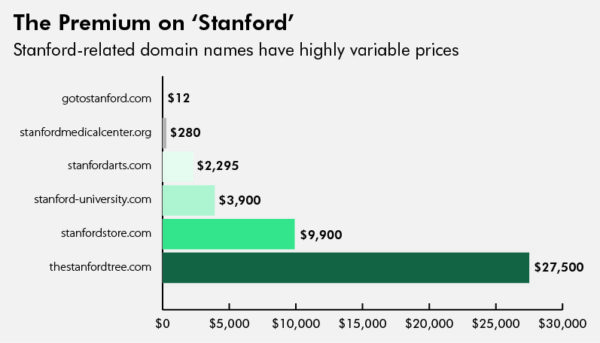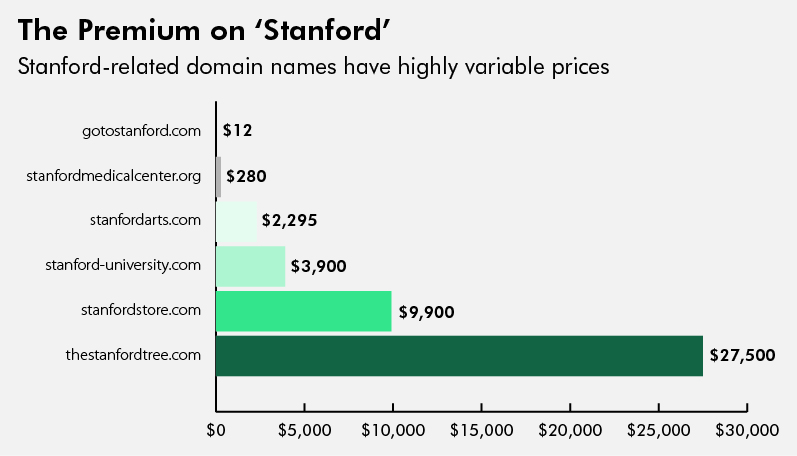
Stanfordstore.com or Stanford.bkstr.com: chances are, an incoming student or someone less familiar with Stanford’s student store would readily visit either website to purchase University-related merchandise. While the latter is the Stanford Bookstore’s official URL, the former is available for sale to the public, along with almost 200 Stanford related domain names on GoDaddy’s auction site alone.
The available domain names, accessible through several domain sale sites like GoDaddy.com and iwantmyname.com, range in price from as $8 to $30,000 at the time of publication. Despite their references to Stanford, they are available to anyone with Internet access and a bank account.
Though there are countless available combinations of nonsensical domain names with Stanford-related words embedded, many of those currently up for sale seem to reflect legitimate Stanford organizations. These fall under a few categories of domain names that might potentially lead to confusion for visitors and a misrepresentation of Stanford. Such domain names seem to implicate the University as a whole, Stanford-affiliated companies and organizations, student organizations on campus and University-run programs.
According to Stanford’s Names and Marks Policy, “The University will protect its name and marks actively from improper or misleading use by individuals or organizations not associated with the institution.” However, the process for executing such protection is unclear.
University spokesperson Brad Hayward said in a statement to The Daily, “Stanford takes protection of its name and trademark very seriously. We have registered many trademarks and domain names that bear the Stanford name or other identifying marks or names.”
Without the resources to register every possible permutation of Stanford in a domain name, Hayward noted, the University takes action to periodically review recent top-level domains to determine if there is any cause for concern on the rise to prevent confusion. Top-level domains refer to identifiers in web addresses such as “edu” in stanford.edu or “com” in google.com.
Registering any of a number of currently for-sale Stanford-related domain names could easily lead to confusion and potential cause for action on the part of the University. Addresses like stanford.net and stanford-university.com might attract visitors looking for the base of Stanford’s digital footprint.
Stanfordrepublican.com and stanforddemocrat.com mimic the political student organizations on campus and could be used to promote political views that appear backed by the University. This might necessitate action on behalf of the University, which claims in its Names and Marks Policy, “Stanford does not permit its name and marks to be used in connection with partisan political activities.”
Stanford-run programs are mirrored in names like stanford.capetown and stanford.berlin, while sports teams might be falsely promoted with for-sale names like stanford.soccer and stanford.tennis. Others, like stanford.dating and stanford.porn, might feign a Stanford connection for activities the University may want distanced from its name.
A purchase of stanfordstore.com by a registrant intending individual profit could have potential for legal action on behalf of the University. According to the Stanford trademark guidelines, “All use of Stanford’s Marks on any merchandise produced by a third party for promotional purposes, whether or not offered for sale, should be discouraged and is not permitted without approval by the Trademark Licensing Office.”
“Sometimes the University will be alerted to an infringing web domain or misuse of the Stanford name,” Hayward said. “If someone uses these domains in a way that creates confusion or that infringes on Stanford’s legal rights to our name and marks, we ask them to desist, and if they do not, we take legal action against them.”
To prevent confusion within Stanford-affiliated entities, University policy encourages the use of stanford.edu domains. Stanford Domains, a project offered by the Office of the Vice Provost for Teaching and Learning (VPTL), is one way of facilitating this by allowing students, faculty and staff the opportunity to register a .edu domain.
“Conducting our online activities under promotes the security and integrity of our network and the information we share on the web,” Hayward said.
Contact Susannah Meyer at smeyer7 ‘at’ stanford.edu.
